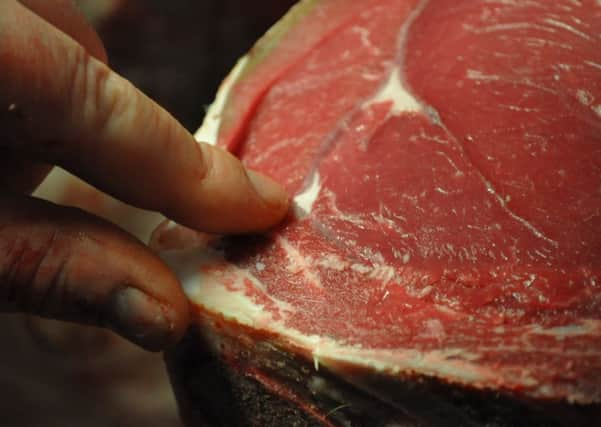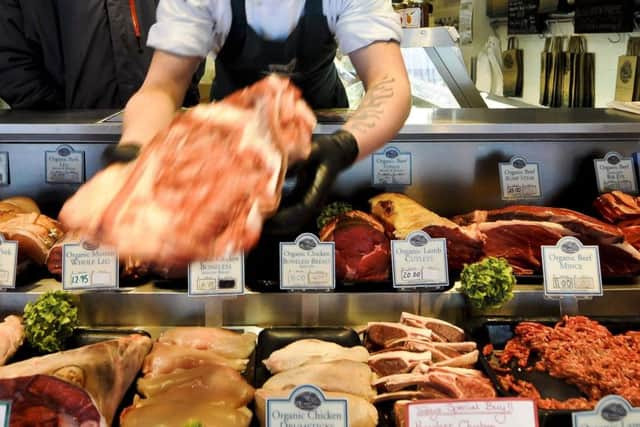Bob Kennard: Small abattoirs are key to meat quality and integrity of food industry


Local farmers would bring their livestock a short distance to be slaughtered, and butchers could typically tell their customers where that week’s meat came from.
An ideal, transparent short supply chain.
Move now to 2018. Fewer than 250 abattoirs exist in the UK. Most meat is sold through supermarkets which are supplied by a handful of multinational companies operating huge factory-style abattoirs.
Advertisement
Hide AdAdvertisement
Hide Ad

The livestock now often travel considerable distances, with the animal welfare, environmental and food miles implications of that, and few customers now know where their meat is from.
A small fraction of the 1930s level of the traditional small abattoirs have hung on, and continue to offer a service for farmers and local butchers to bring their animals a short distance for slaughter.
But for how much longer?
A third of small abattoirs have closed in the past decade, and half a dozen have been forced to shut in the past year.
The latest, in Somerset, had been operating for 120 years.
Advertisement
Hide AdAdvertisement
Hide AdAll very sad, but surely, this movement to ever-larger businesses is just a reflection of what has happened to countless industries across the country, so why should we care?
Quite simply, if this trend of small abattoir closures continues, we will soon be unable to buy local meat from named farms.
This is not because large abattoirs can’t trace a carcass back to a farm (the law requires they must), but they could not easily do so for individual packs of meat, as they deal in batches of animals. Also, they are simply not set up for that sort of service. They deal with volume.
And it’s not just a question of a loss of consumer choice at a time when more people want to know the story behind their food.
Advertisement
Hide AdAdvertisement
Hide AdMany traditional family livestock farmers now rely on selling their own meat to local pubs and restaurants, as well as to individual consumers.
The extra margin they can make is crucial to surviving as a business. For many farmers, selling their own meat is a way of keeping the family farm going, to pass on to the next generation.
Butchery and animal slaughter are highly skilled crafts. As smaller abattoirs close, so these quality jobs are lost.
And it doesn’t stop there. Other businesses rely on smaller local abattoirs, such as sausage makers, charcutiers, quality bacon makers, pie makers, and so on, many of them innovators, and all of them adding value to fully traceable local meats.
Advertisement
Hide AdAdvertisement
Hide AdWith no supply of their raw material, they will also close, further damaging the local economy.
Local butchers’ shops, farmers markets, and farm shops all rely on smaller abattoirs, as do an increasing number of pubs and restaurants whose customers want to know the provenance of the meat on their plate. No smaller local abattoirs means no fully traceable local meat.
The list of the impacts from the closure of local abattoirs goes on. So much so that 34 diverse organisations have signed a joint letter to Michael Gove, the Secretary of State at Defra, asking him to take urgent action to stem the decline, and encourage new abattoirs to open, possibly including mobile abattoirs. There are solutions, but time is perilously short.
Why does the decline in these vitally important small businesses continue? It has been described by the President of National Craft Butchers, John Mettrick, himself a small abattoir owner from Derbyshire as “a perfect storm of problems: increased costs, rock bottom prices for hides and skins, some gold-plated regulations, and excessive paperwork, much of it involving unnecessary duplication”.
Advertisement
Hide AdAdvertisement
Hide AdThe UK meat industry is diverse in terms of size of meat plants, but all, both large, medium and small, have their specific job to do within the meat supply chain.
The EU regulations which govern meat production are designed to protect the consumer from harm, set animal welfare standards, and enable UK producers, mostly the large operators, to export British meat to Europe.
However, because of the one-size-fits-all nature of the legislation, some of it is not appropriate to smaller abattoirs.
Whilst there are derogations or exceptions within the regulations, which could assist smaller plants, some of these have not yet been taken up by the UK government.
Advertisement
Hide AdAdvertisement
Hide AdAs a result, many smaller abattoir owners feel ground down by the unnecessary and inappropriate nature of some of the rules, and the volume of paperwork which is required of them.
So, no wonder that the average age of these owners is pushing 70.
As viability continues to be squeezed, many more small abattoirs will close when the current owners retire, if not before.
Without urgent action to assist these smaller abattoirs, the road to extinction is set, and with it the future of fully traceable local meat and all the implications of that.
Advertisement
Hide AdAdvertisement
Hide AdWhen asked at a public meeting what the solution is to these problems, Michael Gove replied: “The answer in a nutshell is more small abattoirs.” There are many people eagerly awaiting the action required to see that vision become reality.
Bob Kennard is policy advisor at the Sustainable Food Trust.